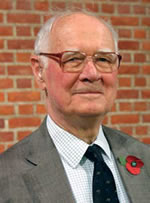27 June 2012
How scientists seek truth
Renowned physicist and theologian Professor John Polkinghorne writes about the scientist’s thirst for knowledge…
Doing research in science is quite hard work, with its fair share of routine and also of occasional frustration as the good ideas of yesterday sometimes look less persuasive in the cold light of today. Why do we do it? We do it because we have a thirst to understand and we believe that we can gain truthful understanding through the quest for well-motivated beliefs. Sometimes these beliefs turn out to be very surprising, in a way that we could not have anticipated without the nudge of nature pushing us in a wholly unexpected direction. I worked in quantum physics and in the subatomic quantum world light sometimes behaves like a wave (that is, spread out and flapping) and sometimes like a particle (that is, a little bullet). In terms of everyday thinking that sounds an absurd possibility. Any philosopher in 1899 would have ‘proved’ such behaviour impossible. Nevertheless that is how light actually behaves and after 25 years of intellectual struggle the physicists eventually came to understand it.
Because of this surprising character that nature has been found to possess, the natural question for a scientist in quest of understanding to ask about a belief, in science or beyond it, is not ‘Is it reasonable?’, as if we felt we knew beforehand the shape that reason had to take. As I have said, no-one in 1899 would have thought the wave/particle
duality of light to be at all reasonable. Instead the natural question for a scientist to ask is a different one, at once more open but more demanding: ‘What makes you think that might be the case?’ It is open, because it does not lay down beforehand the form that the belief has to take, but it is also demanding, in that if a surprising belief is being asserted it will have to be backed up by motivating evidence.
I call this sort of thinking ‘bottom-up’ thinking, because it seeks to move from experience to understanding, in comparison with ‘top-down’ thinking, which assumes it knows beforehand the general principles that restrict what is believable. I am very content to approach my Christian beliefs in the same spirit.
At the heart of Christian belief lies a duality even more surprising and profound than the wave/particle duality of light. It is the duality of humanity and divinity in Jesus Christ. Of course, he was a human being, but when the first Christians came to write in the New Testament about the transforming power of the risen Christ which had come into their lives, they found that they were driven to use divine-sounding language about him – for example, calling Jesus ‘Lord’, a title which belonged to the God of Israel. The Church down the ages has continued to find that it has to speak in this fashion. To do so is not an indulgence in groundless speculation, but a consequence of experience. If Jesus were not human, he would not be of relevance for us; if he were not also divine, he would not be able to be our Saviour. Once more, well-motivated belief has led us to a surprising conclusion.
One final thought. I worked in particle physics in the course of a period in which we discovered that nuclear matter is made up of constituents which are called ‘quarks’. Yet no one has ever seen a quark on its own. We believe that they are so tightly bound within the observable particles which they constitute that they can never be driven out. In a word, quarks are unseen realities, whose existence we believe in because it makes sense of great swathes of directly observable physical experience. God is an unseen reality, whose existence makes sense of great swathes of spiritual experience.
 I believe that science and Christianity are friends and not foes, precisely because both are concerned with the search for truth, a truth to be attained through well-motivated beliefs.
I believe that science and Christianity are friends and not foes, precisely because both are concerned with the search for truth, a truth to be attained through well-motivated beliefs.
The Rev Dr John Polkinghorne KBE FRS was professor of mathematical physics at the University of Cambridge from 1968-1979, was ordained in 1982 and was president of Queen’s College, Cambridge, until 1996. He is the author of 26 books on the relationship between science and religion.
You might also be interested in
- 16 Mar 2018 Stephen Hawking and hope for the future
- 09 Feb 2018 Faith in outer space

